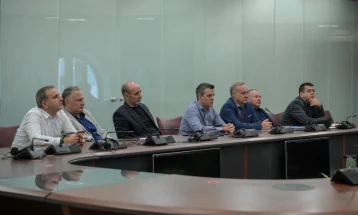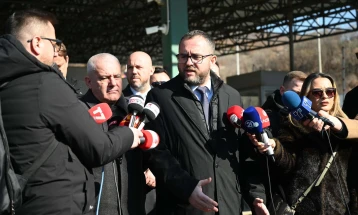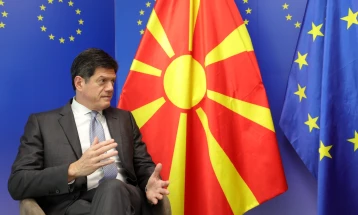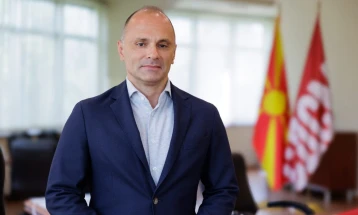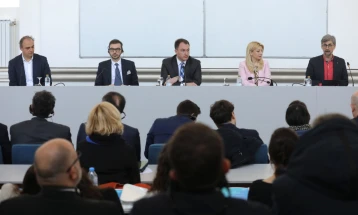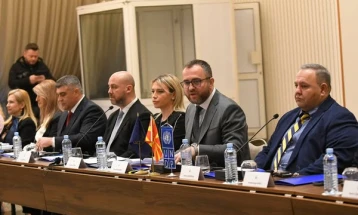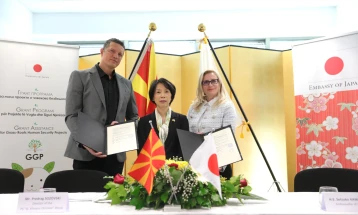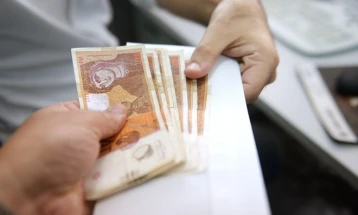Siljanovska Davkova: EU leaders to find creative solution for us as they did for other states, by respecting our identity
- President Gordana Siljanovska Davkova said Friday at the Macedonian Academy of Sciences and Arts that she welcomed the government's increased visits to the United States because the US was an important strategic partner.
- Post By Magdalena Reed
- 20:25, 21 shkurt, 2025
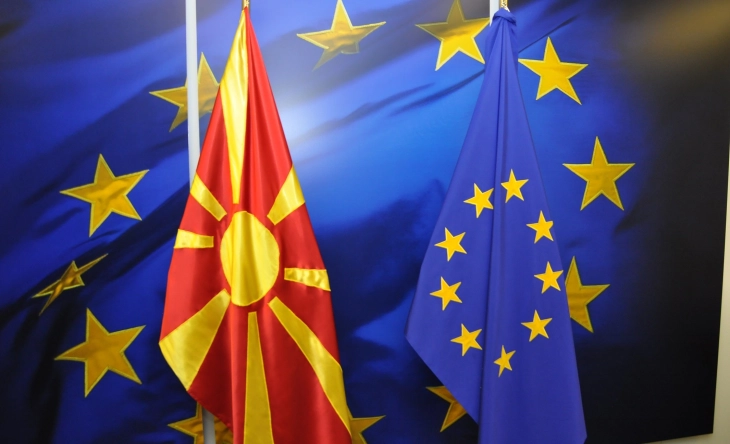
Skopje, 21 February 2025 (MIA) — President Gordana Siljanovska Davkova said Friday at the Macedonian Academy of Sciences and Arts that she welcomed the government's increased visits to the United States because the US was an important strategic partner.
"Why the United States — it is clear why, of course. Not because the US ambassador rightly says it is the right step to take, but because we all know politics. We know the US is based on the lobbying system," President Siljanovska Davkova said when asked to comment on the government's more frequent diplomatic travels to the US.
"We have rarely had the opportunity like now to know key actors and factors in creating American politics. Probably that place is a good place to create a strategy and I welcome this activity," she said.
Asked if she was optimistic about finding a solution to the dispute with Bulgaria as the new Sofia government seemed to share their predecessors' views, the head of state highlighted the importance of the UN Charter and the Universal Declaration of Freedoms and Rights as well as of Wilsonian principles.
"Both documents affirm the right to self-determination of every nation," the President said. "Wilson's principles imply the right to determine your name, flag, coat of arms, anthem, constitution, political system and the like, and this is guaranteed for every nation."
She said she believed in principles and values. "Without them there is no EU, there is no UN," she added.
"The EU's documents — the Treaty of Lisbon, the Charter of Fundamental Rights — speak of respecting national and cultural identity, respecting dignity, integrity, respecting the UN Charter and other acts, respecting court judgements, including those of Strasbourg and The Hague," she said.
"I believe in bona fide. I don't believe in mala fide. So I have no problem talking about things everyone is talking about," Siljanovska Davkova said.
She noted that throughout history the EU had been very creative when accepting some members into the bloc. She pointed to the examples of Greece, Bulgaria and Romania.
"When Greece was to join the EU, the Parliament said no, the Commission said no, and the Council said yes. And it wasn't a mistake. It was an extraordinary move to accept them so they can spread democracy. For other countries, especially from the Balkans — Romania, Bulgaria — there have been a lot of creative solutions, as well. So, I leave it to European leaders to find a creative solution to provide us with what they ask from all countries to do: respect people's identity, be it national or cultural," Siljanovska Davkova said.
"And to let us prove that we do not understand the Copenhagen criteria as Hamlet, wandering around in the Balkans, but that we want to implement them," she pointed out.
The President said the EU should "debilateralize enlargement," because these were times when Europe needed to be united. "We should not prove to anyone that historically, culturally, let alone geographically, we have always been part of Europe," she said.
The Macedonian Academy of Sciences and Arts president Zhivko Popov said Prime Minister Hristijan Mickoski's proposal for constitutional changes with a delayed effect was a great political idea and it should be discussed with Bulgaria.
"We need to continue talks with our neighbors, because they have been here for centuries, and so have we. None of us will leave," he said, adding: "And we need to talk more than we need to negotiate."
Popov said the Macedonian Academy of Sciences and Arts should restore relations with the Bulgarian Academy of Sciences. He said that at one point a few years ago they had collaborated on 34 projects, until they were suspended in 2019 after a Macedonian declaration and a Bulgarian manifesto regarding the language.
"I think we should start collaborating with the Bulgarian Academy of Sciences on scientific research again and talk to each other as much as possible," he said. mr/
